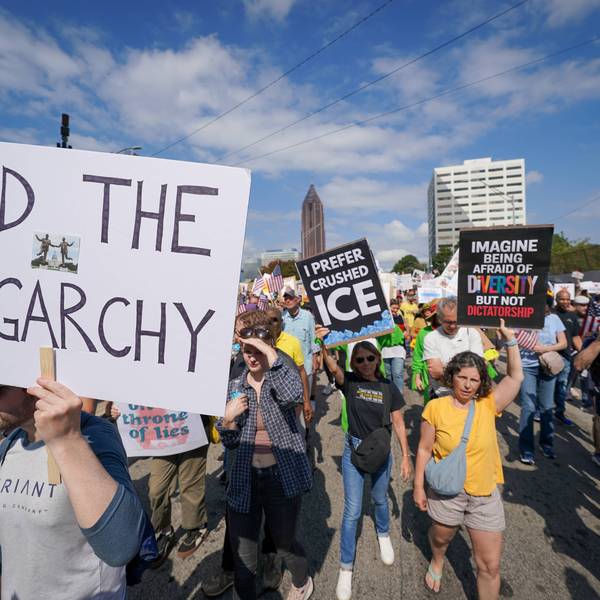Tonight, President Trump is set to deliver his first State of the Union speech, in which he will likely provide a triumphalist account of the economic policy changes made during the first year of his presidency. But despite big talk on the campaign trail about how he would stand up for the forgotten working man (for Trump, it was always men who were left behind), the first year of the Trump presidency has been no triumph for typical American workers. Instead the big winners over the past year have been the already rich.
This really shouldn't come as a surprise. Trump's was crystal clear in his inaugural address about who he considers the cause of American workers' disempowerment: foreigners. This diagnosis is stunning not just in how wrong and bigoted it is, but how cynically it attempts to distract from the privileged group that really was reaping gains that should have been broadly shared--the top 1 percent and their enablers. His agenda of continuing the upward redistribution of income to this top 1 percent while scapegoating immigrants and allegedly nefarious foreign governments is essentially the orthodoxy among the Republican Congressional majority, and it will do nothing to help America's workers.
The cynicism is clearest when considering the signature piece of legislation signed by Trump, the Tax Cuts and Jobs Act (TCJA). The TCJA provides a number of temporary tax cuts to households, most of which will accrue to those at the top of the income distribution. But it saves its permanent tax cuts for the nation's corporations, whose profits eventually flow overwhelmingly to the richest households in America. By 2027, when the household tax cuts have expired but the corporate tax cuts remain, the top 1 percent will see 83 percent of the gains from the TCJA. Corporations have been so giddy about the windfall they've reaped from the TCJA that they've mounted an absurdly transparent public relations campaign on its behalf, claiming that every bonus and wage increase they have bestowed since its passage was somehow the result of it--even those that occurred before the TCJA actually took effect. This is, needless to say, not how economics argues that tax cuts can potentially boost wages. It's also important to note that in any given year about half of all workers see raises, and nearly 40 percent receive bonuses. In short, it is extremely likely that not a single worker who wasn't a high-placed CEO or corporate manager has seen a raise because of the TCJA. And if they got a bonus this year because of the TCJA, it was a likely a one-time attempt by their employer to sneak in a deductible expense before the tax cuts made these deductions less profitable, and no future TCJA-linked bonuses will be seen again.
Meanwhile, although the composition of the Federal Reserve Board of Governors generates a lot less heat than debates over the TCJA, Trump's first two picks for new Fed governors--Randal Quarles and Marvin Goodfriend--are likely to do great damage to American workers. Both of these new governors have been fierce critics of Fed actions since the Great Recession that consistently pushed the economy more quickly towards recovery. Goodfriend, in particular, was notably wrong in his predictions. With the unemployment rate still at 7 percent in 2012, he argued that the Fed should have stopped trying to support further recovery because its efforts would fail to reduce unemployment any more, and would instead have just sparked out-of-control inflation. Since then, the unemployment rate has dropped 3 percentage points--allowing about 4.5 million workers to find jobs--and inflation is still below, not above, the Fed's stated target of 2 percent. Both Quarles and Goodfriend have also consistently argued that the regulatory safeguards put in place after the financial crisis of 2008 should be rolled back. Giving up on American workers with the unemployment rate still at 7 percent while wringing their hands over regulations that might restrict possibilities for Wall Street profit-making doesn't sound much like "standing up for the forgotten." Worse, the Trump administration has three more vacancies on the Fed Board of Governors left to fill. This is in part because while he was elevating friends of Wall Street in the Fed, President Trump also broke with a long precedent and failed to re-appoint the incumbent Fed Chair, Janet Yellen. Economic observers and economists are nearly united in their view that Yellen is easily the most-qualified person ever to have held the job of Fed Chair, and that her performance in that role was exemplary. Failing to re-appoint Yellen was simply a triumph of sexism and partisanship over merit.
Protecting Wall Street is a common theme in the first year of the Trump presidency. Besides his Fed picks, Trump has also installed Mick Mulvaney as the head of the Consumer Financial Protection Bureau (CFPB). Mulvaney is a long-time enemy of the CFPB, and has already rolled back regulations protecting borrowers from the worst abuses of payday lenders. As a congressman from South Carolina, Mulvaney ranked ninth among all his peers in how much money he raised from the payday lending industry. Their investment has paid off well. Besides the regulatory rollbacks, Mulvaney also released a memo to CFPB staff informing them that the Bureau exists to "serve" these and other financial institutions.
The attack on regulations that bolster the economic security of working Americans is another common theme in the first year of the Trump presidency. His administration has, for example, delayed key provisions of the fiduciary rule and signaled its intention to weaken it further. While "fiduciary rule" sounds wonkish, it's not. It's a rule that simply states that financial advisors are not allowed to cheat their clients by doing things like steering their money into vehicles that provide low rates of return to the clients but high fees to the advisors. It is the rock-bottom lowest standard that one could imagine for an industry that exists to help working Americans manage their financial decisions. Conflicted advice that steered money to financial vehicles that generated high fees for advisors rather than high returns for savers costs Americans about $17 billion each year. This is $17 billion transferred directly from working Americans to Wall Street firms. The fiduciary rule was designed to stop this transfer, but the Trump administration is working hard to make sure it continues.
Aside from the fiduciary rule, the Trump administration has also made clear its intention to undermine the improved threshold defining who is automatically entitled to overtime pay. Before 2016, only workers earning less than $23,660 a year were automatically eligible for overtime protections based on their pay. The Obama administration increased this threshold to roughly $47,500--a moderate level, given that if it had simply been adjusted for inflation over the past 40 years, it would be well over $50,000. The Trump administration argues that this is too high, and if they have their way millions of workers will lose the right to be paid anything for hours they work in excess of 40 per week.
A particularly recent regulatory attack on workers is the "tip stealing" rule, another rollback of an Obama-era regulation. In 2011, the Obama administration issued a rule that codified the long-standing DOL practice of safeguarding tips as the property of workers, not employers. The Trump administration has proposed a rule that would rescind portions of those regulations and allow restaurant owners to confiscate tips. The administration often claims that this rule would simply allow owners to pool tips and cut in back-of-the-house workers. But the rule as written explicitly allows owners to simply keep the money and not distribute it to employees. We estimate that as a result of the rule, $5.8 billion would be transferred from workers to employers, with nearly 80 percent of that--$4.6 billion-- taken from women who are working in tipped jobs.
Further, by nominating Neil Gorsuch--who has a record of ruling against workers and siding with corporate interests-- to the Supreme Court, Trump has stacked the Court against workers. Trump has also nominated Cheryl Stanton to serve as the administrator of the Wage and Hour Division at DOL and Rob Emanuel and Peter Robb to serve as member and general counsel of the NLRB, respectively. All three of these nominations to fill important posts at agencies that are supposed to protect workers' rights fall squarely in the "fox guarding the henhouse" category, as all have spent their careers representing employers, not workers.
Besides changing federal regulations, the Trump administration has also opened up room for states to change rules governing Medicaid eligibility. Specifically, they have changed rules to allow states to introduce work requirements for Medicaid recipients. It is hard to overstate how cruel and stupid this policy change would be. For one, the vast majority of non-elderly, non-disabled adults on Medicaid already live in households with a worker. For another, those non-elderly, non-disabled adult son Medicaid that don't work often don't because they are caring for a child or an elderly relative or going to school. Further, Medicaid eligibility is already restricted by an income test--those on Medicaid have very low incomes and clearly face large obstacles to finding steady work. These obstacles will balloon the next time there is a recession, and a work-requirement will end up simply punishing some of the most vulnerable families in America because of the business cycle. Finally, there are numerous well-documented advantages to large public insurance programs. Medicare and Medicaid, for example, have done a far better job than private-sector health insurance companies in restraining cost-growth, even for commonly-defined benefits. The long-run push in American health reform should be to enroll more, not fewer, people in these large public plans, as the most promising strategy for containing costs without simply denying care to people.
Finally, the most salient issue right now in American politics is the fate of the DREAMers--undocumented immigrants who were brought to the United States by their parents as children and who have lived their lives here and become as American as anybody else in the country. (They are called DREAMers after the DREAM Act--or, the Development, Relief, and Education for Alien Minors Act--which was proposed to provide them residency status followed by a (quite long) path to citizenship). There was once broad public agreement that the DREAMers should be protected and allowed to continue living in the United States permanently, eventually as full-fledged citizens. But because the congressional Republican majority is terrified of the loud and bigoted minority of voters who are opposed to helping the DREAMers, in 2012 the Obama administration started the Deferred Action for Childhood Arrivals (DACA) policy, which allowed DREAMers to be free of worry about forced removal from the United States, go to college, and obtain 2-year renewable work permits. The DACA status quo inherited by the Trump administration was far from optimal, but it at least protected DREAMers who met DACA's requirements--and kept us from becoming a country that would round up nearly a million people who had done nothing wrong and knew no other country, destroying their lives by exiling them to nations that were completely foreign to them. Months ago, the Trump administration tore up this status quo for no reason except to cater to their bigoted base voters. They now are seeking to use the manufactured crisis of ending DACA to leverage draconian changes to overall immigration policy in exchange for cleaning up the mess they made. The most recent immigration demands of the Trump administration in exchange for providing security to DREAMers are: clamping down on family re-unification immigration, ramping up arrests and deportations by Immigration and Customs Enforcement officials, further militarizing the border, and, crucially, providing no path to legalization for the more than 9 million unauthorized immigrants who aren't DREAMers. These demands would provide no relief to American workers hoping for better jobs and wage growth; indeed, the smart move to boost wages with immigration policy is to bring unauthorized immigrants out of the shadows and into legal status and citizenship so that they enjoy the full protections of employment law. If these workers could no longer be easily exploited, their wages would rise and put less intense downward pressure on the wages of U.S. workers. Instead, the Trump immigration demands are about indulging the bigotry and xenophobia of their base.
The first year of the Trump presidency has been a steady stream of attacks on the economic security of anybody who relies on work rather than wealth as a source of income. Recent weeks have seen much talk about the "normalization" of Trump, with many pointing out that the Trump economic agenda is actually not out-of-step at all with the preferences of more mainstream conservative Republican policymakers like House Speaker Paul Ryan. This does not make it any better. Instead it highlights how united the Republican majority in Congress is around the Trump agenda, and points out the need for an alternative that tries to restore economic leverage, bargaining power, and security to America's low- and middle-income families. The only silver lining of the Trump presidency is that his unique unlikability has made more Americans pay attention to policy debates. And when Americans pay attention, it turns out they really don't like the conservative Republican agenda.




